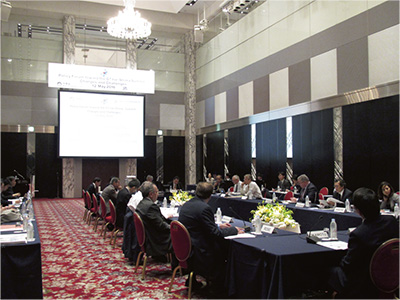Diplomatic Bluebook 2017
Chapter 4
Japan's Diplomacy Open to the Public
3.Role of Intellectuals, etc. in Diplomacy
In building a future international order in the drastically changing world, it is becoming more apparent that experts from the private sector can take the initiative in freely conducting policy discussions on a global scale without being bound by the official views of governments, which in return have an impact on the world's opinion, as well as on the policy decisions of each government.
Some of the examples include World Economic Forum (Davos), which has a large influence on the international economic policies of each country, and the Shangri-La Dialogue, which provides prominent experts and ministers of the world with an opportunity to discuss Asian security issues. There is an ever increasing importance to develop human resources of think tanks (study and research institutions) to take part in such discussion arena and to utilize experts of universities and other organizations in major countries.
In order to strengthen Japan's diplomatic power in the medium- to long-term by expanding the intellectual base on Japan's diplomacy and security and promoting diplomacy that involves a broad range of people, MOFA launched a subsidy scheme for study/research on foreign policy and security in FY2013 which aims to enhance think tank's abilities to collect/analyze/release information and to make policy recommendations. The outcomes of the study and research have been used for foreign policy planning. The subsidy scheme continued to be implemented in FY2016.
In 2016, experts' meetings were held including the one in May in the run-up to the G7 Ise-Shima Summit under Japan's presidency, and had lively discussions among experts.
 Policy Forum toward the G7 Ise-Shima Summit: Changes and Challenges (May 12, Tokyo)
Policy Forum toward the G7 Ise-Shima Summit: Changes and Challenges (May 12, Tokyo)